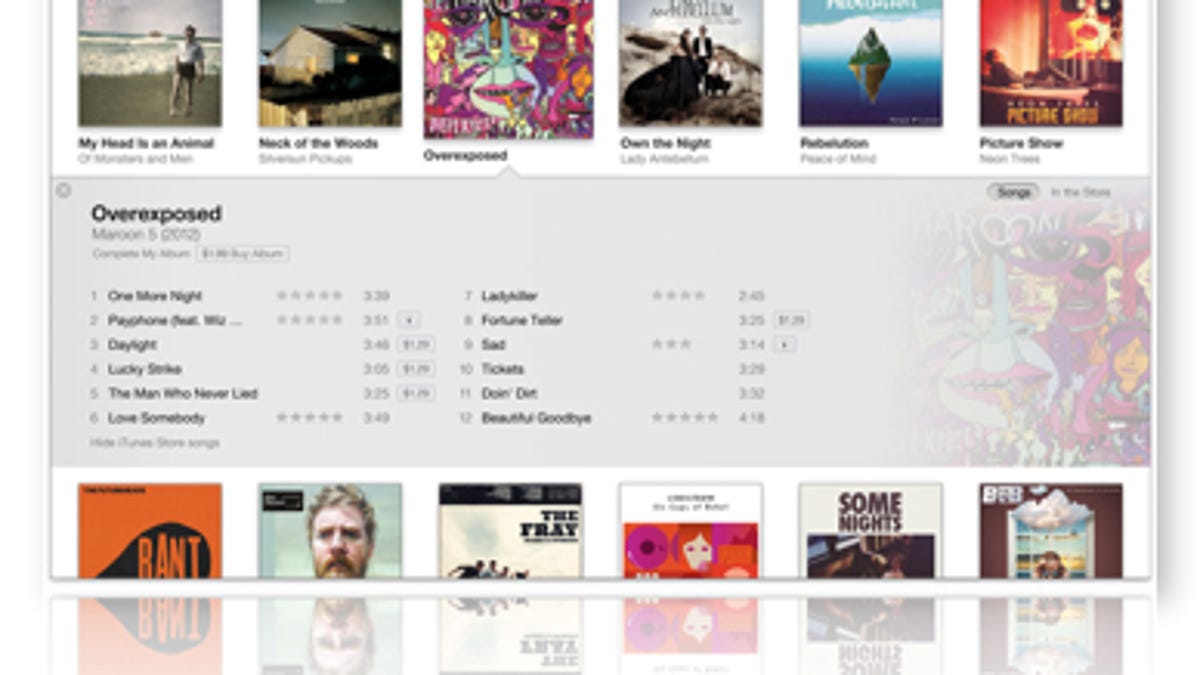Apple turns iTunes up to 11: Software at a crossroads
Apple's next major version of iTunes is due out soon, but not with the feature that can help fend off competitors.

Twelve years ago Apple was lagging.
Consumers with PCs were ripping music to their hard drives and creating mixes. They were even taking those mixes and burning them onto CDs for listening to in the car, or on the go. The same experience could not be had easily on a Mac.
Apple's solution was iTunes. A piece of software that promised to do all those things, but with more simplicity than rivals, and only on a Mac.
iTunes quickly became a case study in the benefits of tightly integrated hardware and software. You had to own a Mac to use it, a tie that became even stronger with the addition of the iPod. The slick MP3 player, which would rocket Apple into incredible growth and popularity as a consumer brand, relied on iTunes to bring it to life out of the box, and keep it alive with content.
Today things could not be more different. The CD is nearly dead. Instead people get their music whenever they want, and wherever they are. This happens on paid streaming services from rivals, as well as through Apple's own paid Match service, which stores copies in the cloud, and lets users re-download them any time.
What's more, Apple's portable devices, which have since stretched from the iPod to the iPhone and iPad, can all be set up and used without even touching iTunes the desktop software. As a result, iTunes is no longer the hub, something that's given the software a bit of an identity crisis.
The next version of iTunes, which Apple says will be out by the end of the month for both Mac and Windows, represents the latest step to address some of these changes in the way people store and use their content on computers. It's more deeply tied into Apple's media store, as well as a user's music collection that can now be backed up and stored indefinitely in Apple's cloud as part of a paid subscription service. Apple's even redesigned its player to put many of the commonly used features in a widget that can be used even when you're doing something outside of iTunes.
All these things are likely to be welcome additions for longtime users, but the fact remains that the software now plays a less important role in the way people are finding, purchasing, and ingesting content.
Consumers have bought more than 20 billion songs from Apple during the past nine years, but where that's happening has changed dramatically. According to Apple, two-thirds of iTunes downloads now come from iOS devices, as opposed to desktops. That statistic, mentioned by the company at the unveiling of iTunes 11 in September, is more impressive when you consider that iOS devices have only been in existence since the iPhone in mid-2007, a little more than four years after Apple added its store to the desktop software in early 2003.
For its part, the experience of iTunes on the desktop versus mobile devices is a tale of two ideologies. On the desktop everything goes through iTunes. If you want to find and download an app, audiobook, podcast, music album, TV show, movie, or even to rearrange your app icons on an attached iOS device -- you can do it through the software. On the iOS device itself, many of those same things are siloed into their own apps. iTunes there is just a store, which puts the content you buy into different app buckets.
Apple has shown little interest in attempting to consolidate all this, and has instead proceeded to break out things like finding, downloading, and listening to podcasts into its own app -- something that used to work from right within iTunes on iOS. But that's not the real issue.
Even with a redesign there looms a threat at the business behind the software. iTunes faces fiercer competition from upstarts that have focused squarely on music on demand. Services like Spotify and RDIO aim to tempt users away from maintaining and storing a library of their own music, instead offering a way to stream anything and everything both on the computer and through apps for portable devices. There's also Google's YouTube, which might sound a bit funny in the same breath as music streaming services, but it's filled to the brim with music tracks that many in the record industry say are cannibalizing demand for Apple's downloads.
Adding to that are streaming radio services like Pandora, which recently pulled in a reported 27 percent year-over-year increase in audience,according to a study by the NPD Group. That same report suggested that listeners were tuning into products like Pandora and other streamers, leading to a 21-point year-over-year drop in playing music files off portable devices.
While the jury remains out on whether such businesses cannot just exist but also thrive in the long term, they're proof that the way people find and discover music continues to change. Apple has fought back by pursuing exclusivity. You can now buy specially mastered music collections and extra content that comes bundled into music albums. Apple has even dabbled in offering previews of entire albums that can be streamed through the software.
The next step is a much-rumored streaming radio product that will rival Pandora and other such services, however it's not a part of iTunes 11 just yet. What's clear is that even when it arrives, you have to believe that there will be few advantages to using it on a computer versus mobile, once again leaving Apple's desktop music product in a lurch.

